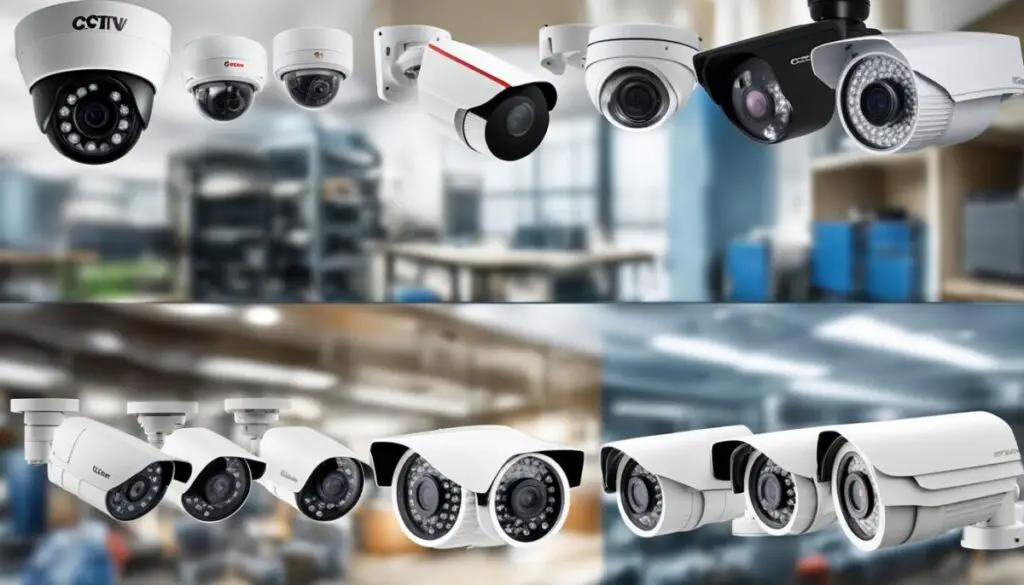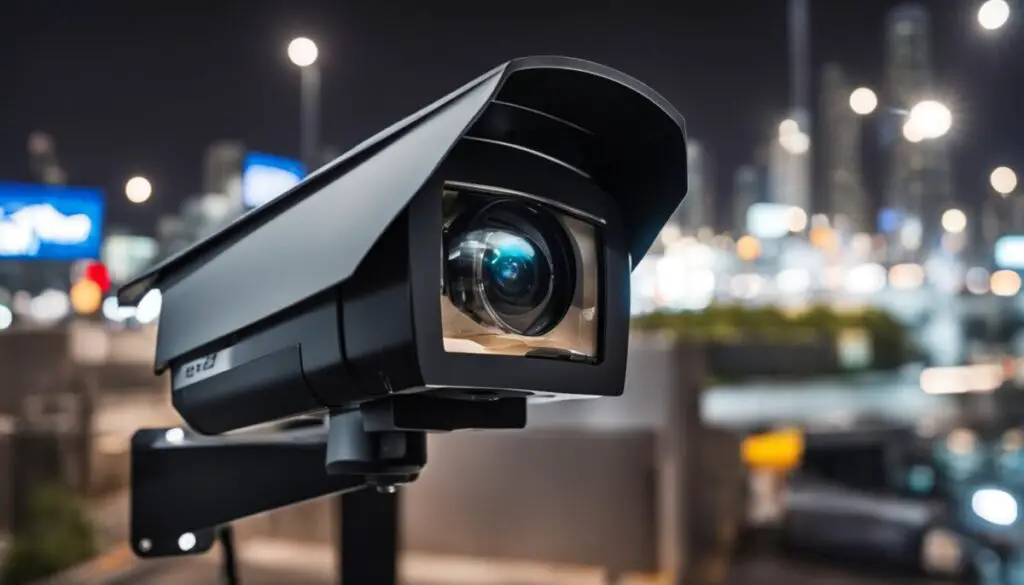Welcome to our comprehensive guide on CCTV cameras, also known as surveillance cameras or security cameras. In today’s world, ensuring the safety and security of both commercial and residential spaces is of utmost importance. CCTV cameras play a crucial role in providing effective surveillance and protection against property crimes, thefts, and fraud. But what exactly are CCTV cameras and how do they contribute to the overall security system?
CCTV cameras are an essential component of closed-circuit television (CCTV) security systems. These systems consist of not only cameras but also recording systems, monitors, video management software (VMS), and other accompanying equipment. They are widely used in various settings such as commercial establishments, schools, small businesses, and even by law enforcement agencies for crime prevention.
Key Takeaways:
- CCTV cameras are crucial for ensuring security and protection against property crimes and thefts.
- They are part of closed-circuit television (CCTV) security systems that include recording systems, monitors, and video management software (VMS).
- These cameras are used in commercial establishments, schools, small businesses, and by law enforcement agencies.
- CCTV cameras are becoming increasingly popular due to their effectiveness in deterring criminal activities and providing evidence for investigations.
- Understanding the different types and features of CCTV cameras is essential for selecting the right system for your specific needs.
Consider the Different Types of CCTV Cameras
When it comes to CCTV cameras, there are different types to choose from, each with its own unique features and benefits. Understanding the various types of CCTV cameras is essential for making an informed decision during the installation process.
One of the main distinctions is between Internet Protocol (IP) cameras and analog cameras. IP cameras are preferred for their compatibility with most applications, making them a versatile choice. On the other hand, analog cameras are suitable for older digital recording systems. Whether you opt for IP or analog cameras, it’s important to ensure proper installation for effective functionality.
Furthermore, you can choose between wired and wireless CCTV cameras based on your specific requirements. Wired cameras are ideal for larger properties with multiple devices, as they offer a reliable connection and consistent power supply. In contrast, wireless cameras are suitable for smaller spaces or areas where extensive coverage is not needed. They are quick to install and eliminate the need for extensive cabling.
Types of CCTV Cameras:
- Internet Protocol (IP) cameras
- Analog cameras
Considerations:
- Compatibility with applications
- Installation requirements
- Wired or wireless connection
“Choosing the right type of CCTV camera is crucial for effective surveillance and security. Understanding the differences between IP and analog cameras, as well as wired and wireless options, can help you make an informed decision during the installation process.”
By considering the different types of CCTV cameras and their respective features, you can select the most suitable option for your needs. Whether it’s for a commercial establishment, school, or small business, having the right CCTV camera in place is essential for enhanced security and peace of mind.
Understanding CCTV Recording Systems: NVR & DVR
When it comes to CCTV cameras, understanding the recording systems is crucial to ensure effective security surveillance. Two common types of recording systems are Network Video Recorders (NVRs) and Digital Video Recorders (DVRs). NVRs are often preferred for their compatibility with IP cameras and ability to offer higher resolution. On the other hand, DVRs are more commonly used with analog cameras and are a cost-effective option.
NVR systems combined with IP cameras provide superior picture quality, wireless capabilities, and require fewer cables compared to analog cameras. This makes them a popular choice for businesses looking to upgrade their security systems. With NVRs, the cameras directly connect to the network, allowing for easy access to live and recorded video footage from anywhere via an internet connection.
DVR systems, on the other hand, are suitable for analog cameras and are widely used in various industries. They offer reliable recording and playback capabilities, making them a practical choice for businesses that do not require the advanced features and higher resolution offered by NVR systems.
Key Features of NVRs and DVRs:
- NVRs offer higher resolution and image quality
- DVRs are more cost-effective for analog cameras
- NVRs provide wireless capabilities and reduced cable requirements
- DVRs are compatible with existing analog camera systems
- NVRs allow for remote access to live and recorded footage
- DVRs offer reliable recording and playback functionality
Choosing the right recording system depends on factors such as the type of cameras being used, the desired image quality, and the specific requirements of the surveillance setup. Consulting with a professional security provider can help businesses make informed decisions and ensure they invest in the most suitable CCTV recording system for their needs.
Selecting Monitors and Video Management Software (VMS)
Once you have installed the CCTV cameras and recording systems, it is important to consider the selection of monitors and video management software (VMS) to ensure effective surveillance. High-definition monitors with suitable resolution are essential for clear and detailed display of the captured footage. This allows for easy identification of individuals, objects, and activities within the monitored areas. When choosing monitors, consider factors such as screen size, resolution, and compatibility with the recording systems.
Video management software (VMS) is another crucial component of a CCTV camera system. It provides advanced features and analytics for enhanced security and surveillance. With VMS, you can efficiently control and manage the recorded footage, access live feeds, and perform various functions such as video playback, motion detection, and exporting of video clips. It also allows for remote access, enabling you to monitor your premises from anywhere with an internet connection.
When selecting VMS, consider the specific requirements of your CCTV system, such as the number of cameras, storage capacity, and integration capabilities. Look for software that offers user-friendly interfaces, comprehensive control options, and customizable settings. Additionally, ensure that the VMS supports the type of cameras and recording systems you have installed.
Regular maintenance of CCTV cameras is necessary to ensure optimal performance. This includes monitoring and adjusting camera angles, cleaning lenses and camera housings, checking power and network connections, and updating firmware and software. By regularly maintaining your CCTV system, you can ensure that it operates smoothly and provides reliable security surveillance.

Key Points:
- Choose high-definition monitors with suitable resolution for clear and detailed display of footage.
- Select video management software (VMS) that offers advanced features, analytics, and remote access capabilities.
- Consider the specific requirements of your CCTV system when selecting VMS.
- Regularly maintain your CCTV cameras to ensure optimal performance.
Understanding Cables, Power Supplies & Routers
Proper cabling and power supply connections are vital for seamless integration and operation of CCTV systems. Analog cameras require coaxial cables and additional power cables to connect to the DVR, while IP cameras can be connected to the NVR recording center using Power over Ethernet (PoE) technology. Wireless CCTV systems require a router for connectivity, while wired systems eliminate the need for a router. Following a proper installation guide is crucial for setting up CCTV cameras and systems correctly.
When it comes to cabling, the type and quality of cables used can significantly impact the performance and reliability of the CCTV system. Coaxial cables, such as RG59 or RG6, are commonly used for analog cameras due to their ability to transmit video signals over longer distances without significant loss of quality. For IP cameras, Category 5e or Category 6 Ethernet cables are used for both video transmission and power supply through PoE technology.
Power supplies play a crucial role in ensuring uninterrupted operation of CCTV cameras. Most analog cameras require a separate power source, usually provided by a power supply unit (PSU) or a power distribution box. IP cameras, on the other hand, can be powered directly through the Ethernet cable using PoE technology, eliminating the need for additional power cables and power supplies.
Key Points:
- Analog cameras require coaxial cables and additional power cables, while IP cameras can use Power over Ethernet (PoE) technology with Ethernet cables.
- Wireless CCTV systems require a router for connectivity, while wired systems do not.
- Proper installation and following an installation guide are essential for setting up CCTV cameras and systems correctly.
Additionally, routers are required for wireless CCTV systems to establish a network connection and enable remote access to the cameras. The router acts as a bridge between the CCTV system and the internet, allowing users to view the camera feeds and manage the system from anywhere with an internet connection. It is important to ensure that the router is properly configured and secured to prevent unauthorized access to the CCTV system.
https://www.youtube.com/watch?v=UrWgV1F7JFs
Overall, understanding the cabling, power supply, and router requirements is essential for a successful CCTV installation. Proper cabling ensures reliable video transmission, while appropriate power supplies guarantee uninterrupted operation. Choosing the right router allows for remote access and management of the CCTV system. By following an installation guide and considering these factors, businesses can ensure a well-functioning and effective CCTV system.
Main Uses and Applications of CCTV Cameras

CCTV cameras have a wide range of uses and applications across various industries and settings. They play a crucial role in enhancing security, deterring criminal activities, and providing surveillance for both commercial and residential properties. Here are some of the main uses and applications of CCTV cameras:
- Deter criminal activities: CCTV cameras act as a deterrent to potential intruders, reducing the risk of burglary, theft, and vandalism.
- Monitor employee productivity: CCTV cameras can be used in workplaces to monitor employee activities, ensuring adherence to company policies and increasing productivity.
- Protect against intrusions and theft: CCTV cameras help protect properties by providing constant surveillance and recording any suspicious activities or unauthorized access.
- Review protocols: In certain industries, such as healthcare or manufacturing, CCTV cameras are used to monitor adherence to safety protocols and identify any potential risks.
- Manage activities: CCTV cameras are used in public places such as stadiums or shopping malls to monitor crowd occupancy, manage traffic flow, and ensure public safety.
- Assist law enforcement: CCTV cameras provide valuable evidence for law enforcement during investigations, helping to identify and apprehend criminals.
Whether it’s a retail storefront, a parking garage, an office environment, or a public space, CCTV cameras are essential for maintaining security, protecting assets, and ensuring the safety of people within the premises.
With advancements in CCTV technology, such as high-definition cameras, facial recognition software, and remote monitoring capabilities, the applications of CCTV cameras continue to expand. It is important for businesses and individuals to understand their specific security needs and select the appropriate CCTV system to meet those requirements.
CCTV Technology Assistance and Expertise
If you’re looking for guidance in selecting and installing the best CCTV system for your business, it’s recommended to seek the assistance of experienced security providers who offer feature-rich CCTV systems. These systems provide various benefits, such as decreased criminal activity, reduced insurance premiums, evidence for insurance claims, and peace of mind through remote monitoring.
One of the key advantages of CCTV cameras is the ability to monitor staff performance and ensure their safety. With a well-designed CCTV system, you can deter criminal activities, protect against intrusions, vandalism, and theft, control crowd occupancy, and even assist law enforcement during investigations and traffic studies.
When it comes to the cost of CCTV installation, it depends on the size and specific requirements of your business. To get an accurate estimate, it’s recommended to consult with security system providers who can assess your needs and provide a detailed proposal tailored to your budget.
Benefits of CCTV Systems:
- Decreased criminal activity
- Reduced insurance premiums
- Evidence for insurance claims
- Peace of mind through remote monitoring
- Staff performance monitoring
- Staff safety monitoring
- Compliance with data protection laws
What is the Purpose of CCTV?

Closed-circuit television cameras, commonly known as CCTV cameras, serve a primary purpose in providing video surveillance for both interior and exterior spaces. These cameras are an integral part of security systems and play a crucial role in enhancing safety and protecting against criminal activities. By closely monitoring areas of concern, CCTV systems provide real-time surveillance, record valuable evidence, and aid in solving criminal cases.
CCTV technology has advanced significantly, expanding the capabilities of these cameras beyond simple observation. Automatic number plate recognition (ANPR) and remote monitoring are just a few examples of the innovative features now available. With ANPR, CCTV cameras can capture and analyze vehicle license plate information, assisting in traffic management and investigations. Remote monitoring enables users to access live video feeds and recordings from anywhere, enhancing overall security and control.
Whether it’s deterring potential intruders, monitoring employee activities, or providing evidence for investigations, the purpose of CCTV is to ensure a safe and protected environment. These systems are widely used in various settings, including commercial establishments, public places, and residential properties, contributing to overall safety and peace of mind for businesses and individuals alike.
Benefits of CCTV Systems
CCTV systems are essential for ensuring the safety and security of your home. With the rise in crime rates, having a reliable surveillance system can provide you with peace of mind and act as a deterrent to potential intruders. Here are some key benefits of installing CCTV cameras:
- Deterrence: The presence of CCTV cameras can discourage criminals from targeting your property. Knowing that their actions are being recorded increases the risk of getting caught, making them think twice before attempting any illegal activities.
- Evidence: In the unfortunate event of a break-in or crime, CCTV footage can serve as valuable evidence. It can help identify the perpetrators, provide details of the incident, and assist the police in their investigations.
- Remote Monitoring: Modern CCTV systems allow you to monitor your home remotely, providing you with real-time access to live footage from anywhere through your smartphone or computer. This feature is especially useful when you’re away from home and want to keep an eye on your property.
- Safe Environment: CCTV cameras not only protect your home from external threats but also create a safe environment for your family. You can ensure the safety of your children, elderly relatives, and pets by keeping a watchful eye on their activities within the house.
Investing in a high-quality CCTV system is a wise decision that can greatly enhance the security of your home. With the benefits of deterrence, evidence collection, remote monitoring, and creating a safe environment, CCTV systems are an invaluable addition to any home security strategy.
Quote:
“Having CCTV cameras installed at home gives me peace of mind knowing that my family and property are protected. The footage has helped us identify suspicious activities in our neighborhood and even played a crucial role in catching a thief who attempted to break into our house. I highly recommend investing in a reliable CCTV system for enhanced home security.” – Jane Doe, Homeowner
Different Types of CCTV Cameras
When it comes to selecting the right CCTV camera for your surveillance needs, it’s important to understand the different types available in the market. Each type of camera offers its own set of benefits and features, allowing you to choose the one that best suits your specific requirements. Here are some of the most commonly used types of CCTV cameras:
Analog Cameras
Analog cameras are the traditional type of CCTV cameras and have been used for many years. They are known for their affordability and compatibility with older recording systems. Analog cameras provide standard resolution and are suitable for basic surveillance needs.
IP Cameras
On the other hand, IP cameras are a modern and advanced option. These cameras utilize your network infrastructure to transmit high-quality digital footage. They offer superior image resolution, flexible installation options, and the ability to access the camera feed remotely via the internet. IP cameras are suitable for both small and large-scale surveillance applications.
Wireless Cameras
Wireless CCTV cameras have gained popularity due to their ease of installation and flexibility. These cameras eliminate the need for extensive cabling, making them ideal for temporary setups or areas where running cables is challenging. They can be easily moved and repositioned as needed, providing flexibility in monitoring different areas.
- Wired cameras offer more reliability and are suitable for larger commercial settings where stability is crucial.
- Wireless cameras are quick to install and are often used in residential or temporary locations.

“Choosing the right CCTV camera type involves considering factors such as desired image quality, installation ease, and the level of flexibility required. Understanding the differences between analog, IP, and wireless cameras will help you make an informed decision and ensure that your surveillance system meets your specific needs.”
CCTV Installation Process
Proper installation of CCTV cameras is crucial for their effectiveness in providing security and surveillance. The installation process involves several key steps to ensure optimal functionality and coverage.
- Camera Selection: Begin by selecting the appropriate type of CCTV camera based on your specific requirements. Consider factors such as resolution, lens type, and camera features to ensure it aligns with your surveillance needs.
- Determine Camera Placement: Carefully assess your property to determine the optimal placement for the cameras. Consider areas of vulnerability, entrances, and high-traffic zones. It is important to position the cameras at the right angles and heights to provide maximum coverage.
- Consider Wiring and Connectivity: Depending on the type of camera chosen (wired or wireless), plan for the required wiring and connectivity. Wired cameras may require running cables through walls or ceilings, while wireless cameras rely on a stable network connection.
- Ensure Privacy and Legal Compliance: Take into account privacy and legal considerations when installing CCTV cameras. Make sure the cameras do not invade personal spaces or record audio (if it is illegal in your jurisdiction). Displaying notices indicating that the premises are under surveillance can also help comply with legal requirements.
Professional Installation Assistance
“Proper installation of CCTV cameras is crucial to maximizing their effectiveness in enhancing security and surveillance. Engaging the services of professionals who specialize in CCTV camera installation can ensure that the entire process is carried out with expertise and precision. These professionals have the knowledge and experience to select the right cameras, determine optimal placement, and ensure legal compliance.”
By following these steps and considering professional assistance, you can ensure a smooth CCTV camera installation process. Properly installed CCTV cameras provide businesses with enhanced security measures, deter criminal activities, and promote a safer environment for employees and customers alike.
Cost Considerations and Budgeting for CCTV Installation
When considering the installation of a CCTV system for your business, it is important to factor in the associated costs and budget accordingly. The cost of CCTV installation can vary depending on several factors, including the size of your business and the number of cameras required. Proper budgeting will ensure that you are able to invest in a system that meets your security needs without exceeding your financial constraints.
To determine the cost of CCTV installation, it is recommended to obtain quotes from reputable security system providers. They will assess your specific requirements and provide you with an estimate that includes the cost of cameras, recording systems, monitors, cables, and any additional equipment needed. Additionally, the installation cost itself should be taken into account, as professional installation ensures proper setup and functionality of the CCTV system.
It is important to note that while the initial cost of a CCTV system may seem significant, it is an investment in the long-term security and protection of your business. By deterring criminal activity, reducing insurance premiums, and providing evidence for insurance claims, a well-implemented CCTV system can ultimately save you money in the long run.
Overall, budgeting for CCTV installation involves considering the cost of cameras, recording systems, monitors, installation, and ongoing maintenance. By allocating the necessary funds and working with reliable security system providers, you can ensure that your business is equipped with a comprehensive CCTV system that fits both your security needs and budget.
Legal and Ethical Considerations for CCTV
When implementing a CCTV system, it is crucial to ensure that you comply with the legal and ethical requirements governing surveillance and data protection. Failure to do so may result in legal consequences and damage to your reputation. Here are some important considerations to keep in mind:
- Know the legal requirements: Familiarize yourself with the laws and regulations specific to your jurisdiction regarding the use of CCTV cameras. These may include restrictions on camera placement, privacy considerations, and data retention policies. Ensure that your CCTV system aligns with these legal requirements to avoid any legal issues.
- Protect privacy: Respect the privacy of individuals who may be captured by your CCTV cameras. Place cameras only in areas where there is a legitimate need for surveillance, such as entrances and high-security zones. Avoid pointing cameras towards private spaces, such as restrooms or areas where individuals have a reasonable expectation of privacy.
- Inform the public: If your CCTV cameras record public areas, it is important to notify individuals that they are being monitored. Clearly display signage indicating the presence of surveillance cameras to ensure transparency and compliance with legal obligations.
- Secure access to footage: Limit access to CCTV footage to authorized individuals who have a legitimate need to view it. Implement strict controls and protocols to prevent unauthorized access, tampering, or misuse of recorded video material. This helps protect the privacy of both employees and customers.
By following these legal and ethical considerations, you can ensure that your CCTV system operates within the boundaries of the law while still providing valuable security benefits for your business.
Selecting Reliable CCTV Service Providers
When it comes to installing CCTV systems for your business, it’s crucial to work with reliable and experienced service providers who can offer high-quality equipment, professional installation, and ongoing support. Choosing the right CCTV service provider can make a significant difference in the effectiveness and longevity of your security system. Here are a few key factors to consider when selecting a reliable provider:
- Reputation: Look for service providers with a solid reputation in the industry. Read customer reviews, check their credentials, and ask for references to ensure that they have a track record of delivering quality service.
- Expertise: It’s important to choose a provider who specializes in CCTV systems and has extensive knowledge and experience in the field. They should be able to assess your security needs accurately and recommend the right cameras, recording systems, and accessories for your specific requirements.
- Partnerships: Consider providers who partner with reputable security companies. This ensures that they have access to the latest technology and can offer you a wide range of camera options to choose from.
- Support and Maintenance: A reliable CCTV service provider should offer ongoing support and maintenance services to ensure that your system is functioning optimally at all times. This includes regular inspections, software updates, and prompt response to any technical issues that may arise.
By selecting a reliable CCTV service provider, you can have peace of mind knowing that your business is protected by a high-quality security system that is professionally installed and maintained. Take the time to research and compare providers to find the one that best fits your needs and budget.

Remember, your security is only as strong as the provider you choose. Don’t compromise on quality when it comes to protecting your business and assets. Invest in a reliable CCTV service provider who can provide you with the peace of mind you deserve.
Conclusion: Choosing the Right CCTV System for Your Business
In conclusion, selecting the right CCTV system for your business is crucial for enhancing security and protecting your assets, employees, and premises. By understanding the different types of CCTV cameras, recording systems, monitors, and accessories available, you can make informed decisions that align with your specific requirements.
When choosing a CCTV system, prioritize factors such as camera functionality, resolution, and installation process. Consider the size of your business and the number of cameras needed. It is also essential to ensure legal compliance by adhering to data protection laws and respecting privacy boundaries.
Partnering with reliable and experienced CCTV service providers can greatly assist you in finding the best system for your business. Look for providers who offer high-quality equipment, installation expertise, and ongoing support. Remember, investing in a comprehensive CCTV security system will provide long-term benefits for your business’s security and peace of mind.
FAQ
What are CCTV cameras?
CCTV cameras, also known as surveillance cameras or security cameras, are video cameras used to monitor and record activities in designated areas for security purposes.
What types of CCTV cameras are available?
There are two main types of CCTV cameras: Internet Protocol (IP) cameras and analog cameras. IP cameras are compatible with most applications, while analog cameras are suitable for older digital recording systems.
What are NVRs and DVRs?
NVR stands for Network Video Recorder, which is a recording system commonly used with IP cameras. DVR stands for Digital Video Recorder, which is a recording system commonly used with analog cameras.
What monitors and software are needed for CCTV surveillance?
High-definition monitors with suitable resolution are required for clear display of captured footage. Video Management Software (VMS) systems are used to control and manage the NVR or DVR systems.
How are CCTV cameras connected?
Analog cameras require coaxial cables and additional power cables to connect to the DVR. IP cameras can be connected to the NVR recording center using Power over Ethernet (PoE) technology.
What are the main uses of CCTV cameras?
CCTV cameras are used in various settings such as commercial establishments, schools, and small businesses for property protection, theft prevention, and internal fraud detection. They are also used by law enforcement agencies for crime prevention.
What are the benefits of CCTV systems?
CCTV systems offer benefits such as decreased criminal activity, reduced insurance premiums, evidence for insurance claims, remote monitoring for peace of mind, staff performance monitoring, and compliance with data protection laws.
What is the purpose of CCTV?
The primary purpose of CCTV is to closely monitor the interior and exterior of premises, providing enhanced security and protection against criminal activities.
What are the different types of CCTV cameras available?
There are various types of CCTV cameras available, including wired and wireless options. Wired cameras offer more reliability and are suitable for larger commercial settings, while wireless cameras are quick to install and often used in residential or temporary locations.
What is the CCTV installation process?
The installation process involves selecting the appropriate camera type, determining the number of cameras needed, ensuring proper placement and position, and considering privacy and legal requirements. It is recommended to consult with professionals for proper setup.
How much does CCTV installation cost?
The cost of CCTV installation varies depending on factors such as the size of the business and the number of cameras required. It is important to budget for both the cameras and the installation process.
What legal and ethical considerations should be kept in mind for CCTV?
Legal considerations include complying with data protection laws, ensuring cameras are placed within private property boundaries, avoiding recording audio (as it is illegal in the UK), and providing notices if recording public areas. Access to recorded footage should be restricted to authorized individuals to protect privacy.
How can I select a reliable CCTV service provider?
It is recommended to work with reliable and experienced CCTV service providers who offer high-quality equipment, installation expertise, and ongoing support. Look for providers who partner with reputable security companies and offer a range of camera options to suit your specific needs and budget.
How do CCTV systems enhance business security?
CCTV systems play a vital role in enhancing business security by monitoring activities, deterring potential intruders, and providing evidence for criminal cases. They protect assets, employees, and premises, providing a sense of security for both businesses and employees.
How do I choose the right CCTV system for my business?
To choose the right CCTV system, it is important to consider factors such as camera functionality, resolution, installation process, legal compliance, and ongoing maintenance. Working with experienced professionals can help you make informed decisions and select the most suitable system for your specific requirements.
